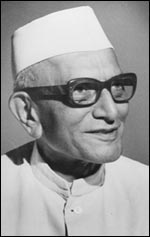Morarji Desai: India’s Resilient Prime Minister
Morarji Desai, a veteran Indian politician, holds a prominent place in the nation’s history as the fourth Prime Minister of India, serving from 1977 to 1979. Known for his integrity, simplicity, and unwavering principles, Desai’s contribution to Indian politics has left a lasting impact on the country. This article aims to shed light on Morarji Desai’s remarkable journey, his notable achievements, and the challenges he faced during his eventful tenure.
Early Life and Political Career
Morarji Desai was born on February 29, 1896, in the village of Bhadeli, Gujarat, during British colonial rule. With an inclination towards public service from a young age, Desai joined the freedom struggle led by Mahatma Gandhi and actively participated in various civil disobedience movements, including the Salt Satyagraha. His association with the Indian National Congress deepened, and he became an influential member of the party.
Post-Independence, Desai held several key positions in the Indian government, including Chief Minister of Bombay State and Minister of Finance at the national level. Under his leadership, the 1957 Bombay Plan laid the groundwork for economic growth, industrialization, and employment generation. This plan served as a building block for India’s future economic policies.
Challenges as Prime Minister
In 1977, after the end of the Emergency period imposed by Prime Minister Indira Gandhi, Morarji Desai emerged as the leader of the Janata Party, a coalition of opposition parties. His ascension to the post of Prime Minister marked a significant turning point in Indian politics.
Desai faced numerous formidable challenges during his tenure. One of the most critical tasks was to restore democratic values and institutions that had been undermined during the dark days of the Emergency. His government stressed the importance of upholding civil liberties, freedom of the press, and the democratic spirit that defined India.
Economic Reforms and Foreign Policy
Desai’s economic policies were based on the principle of individual initiative and self-reliance. He advocated for free-market reforms, reducing government intervention, and easing regulations. Under his leadership, the government implemented measures to boost agricultural production, promote rural development, and initiate fiscal discipline to curb inflation. However, his economic policies faced criticism for being overly orthodox and lacking significant strides in poverty alleviation.
Desai also made considerable efforts to improve India’s relations with neighboring countries and build a peaceful South Asian region. His visit to Pakistan in 1978 was a groundbreaking step towards thawing tensions between the two countries. Additionally, he played a crucial role in normalizing India’s relationship with China, which had been strained for decades.
Legacy
Though Desai’s tenure as Prime Minister lasted only two years, his legacy reverberates to this day. He staunchly upheld the principles of honesty, integrity, and transparency, earning him the nickname of “Mr. Clean.” His personal lifestyle, characterized by frugality and simplicity, embodied his commitment to ethical governance.
Morarji Desai’s emphasis on personal liberties and democratic values left an indelible impact on the nation. India’s commitment to these principles remains one of his most significant contributions.
Furthermore, Desai’s diplomatic efforts and pursuit of peaceful relations contributed to regional stability, earning him respect not just within India but also on the international stage. His advocacy for non-alignment in foreign policy showcased India’s determination to chart an independent course on the global stage.
Conclusion
Morarji Desai, a man of strong principles, played a pivotal role in shaping India’s political landscape. As Prime Minister, he successfully steered the nation out of a tumultuous period, restoring democratic values and promoting personal liberties. Desai’s unwavering commitment to honesty, simplicity, and transparent governance still serves as an inspiration for the country’s leaders.
Despite the challenges he faced during his tenure, Morarji Desai’s legacy emphasizes the importance of integrity, democratic values, and peaceful coexistence. His contributions to economic reforms and foreign policy initiatives have left an enduring impact on modern India. Morarji Desai will always be remembered as a resilient leader who navigated the complex political terrain with unwavering dedication to India’s progress.


